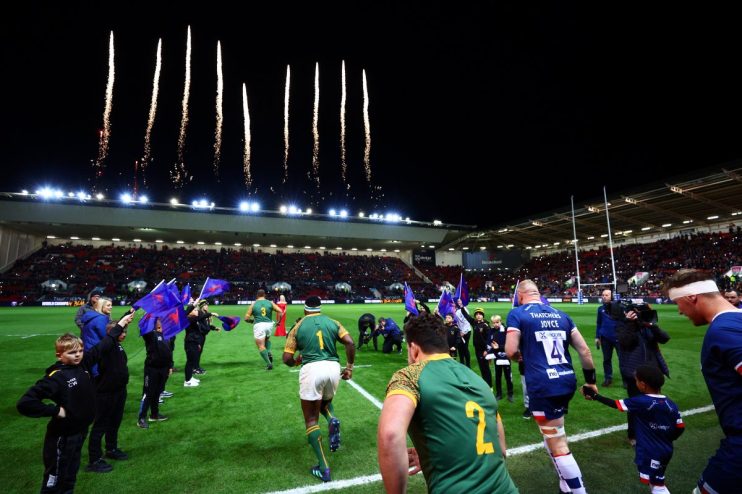
[ad_1]
Friday 25 October 2024 3:00 pm
| Updated:
Thursday 24 October 2024 1:13 pm
Share
Facebook Share on Facebook
X Share on Twitter
LinkedIn Share on LinkedIn
WhatsApp Share on WhatsApp
Email Share on Email
 Rugby’s ‘A’ games are crucial for development and capture, and are the hidden gems of this year’s Autumn Nations Cup period.
Rugby’s ‘A’ games are crucial for development and capture, and are the hidden gems of this year’s Autumn Nations Cup period.
Rugby’s ‘A’ games are crucial for development and capture, and are the hidden gems of this year’s Autumn Nations Cup period.
This weekend, when Japan and New Zealand clash in Yokohama, marks the start of the rugby’s Autumn international period.
The majority of major southern hemisphere teams travel to Europe to face the best of the north.
England, for example, will take on New Zealand, Australia, South Africa and Japan across four consecutive weekends beginning on 2 November.
Ireland, Wales and Scotland are among the other nations hosting touring outfits over the next five weekends.
But look a little deeper into the fixtures and there are some interesting matches involving A teams and clubs.
Next Saturday Munster take on an All Blacks XV, who in turn face Georgia the following week.
On 5 November Premiership Rugby club Bristol Bears face an Australia XV, who take on an England A side on 17 November.
And at the end of the month a Scotland A side play Chile in Edinburgh. But why? Well there could be a number of reasons.
Capture
The most obvious reason, for the international teams anyway, for these fixtures is to capture players. When you play for England A you become “captured” by England despite not getting an official cap – this means you’d need to go a number of years without another game before you could switch allegiances to another nation.
Among the bigger rugby nations it is common for players to qualify for multiple teams due to lineage, and therefore being captured can stop you from going to a rival team.
This is the cynical view, as England’s executive director of performance Conor O’Shea said earlier this year.
“It [dual-country-eligibility] doesn’t really come into consideration at all,” he said. “We have been very open and had some conversations with players as well to make sure it’s not looking like this, we want to make sure that it’s what we believe it is for, that bridge.
“We don’t have many of them and if we did, there are plenty of players that we could look at and say, ‘We will pick a, b, c and d’ and we haven’t done that, we wouldn’t do it down through the system either. Some people have said, ‘Should we fast-track some player?’ No, we will do it when it’s right.”
Depth development
For those nations who have a wealth of talent but few rugby games to test it out, additional A games can be the answer.
For the likes of the All Blacks and Australia these matches present a good opportunity to see who can make it in the big time.
Not only are you testing their ability to be coached, but they – in the case of this year – will play in a hostile atmosphere against Munster and against internationals in Georgia. It’s a challenge.
And while these semi-international outfits will be expected to win, they’ll come up against club veterans keen to lay down a marker or two. It won’t be easy.
And then for Chile, who were brilliant in qualifying for the Rugby World Cup in 2023, a match against Scotland A will give them a shot at developing their playing style against a team who don’t conform to the South American style. They’re all intriguing match-ups.
Money, money, money
It is fair to say rugby has not managed to revolutionise itself commercially in recent years, and clubs continue to struggle.
The arrival, then, of a marketable opportunity for Bristol against Australia A and Munster against an All Blacks XV is crucial.
These games come in addition to any planned season fixtures so can be a real money spinner for the clubs involved.
Bristol Bears put on a show in 2022 against South Africa, selling out Ashton Gate and raking in the cash.
These rugby games may look irritating for fans, especially when they’re mid-week, but they’re keeping clubs relevant and promoting forward thinking.
Similarly tagged content:
Sections
Categories
People & Organisations
Related Topics
[ad_2]
Copyright for syndicated content belongs to the linked Source link

